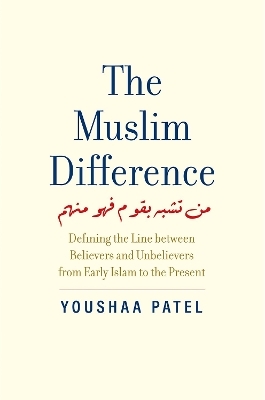
The Muslim Difference
Defining the Line between Believers and Unbelievers from Early Islam to the Present
Seiten
2023
Yale University Press (Verlag)
978-0-300-24896-8 (ISBN)
Yale University Press (Verlag)
978-0-300-24896-8 (ISBN)
A sweeping history of Muslim identity from its origins in late antiquity to the present
How did Muslims across time and place define the line between themselves and their neighbors? Youshaa Patel explores why the Prophet Muhammad first advised his followers to emulate Christians and Jews, but then allegedly reversed course, urging them to “be different!” He details how subsequent generations of Muslim scholars canonized the Prophet’s admonition into an influential doctrine against imitation that enjoined ordinary believers to embody and display their religious difference in public life.
Tracing this Islamic discourse from its origins in Arabia to Mamluk and Ottoman Damascus, colonial Egypt, and beyond, this sweeping intellectual and social history offers a panoramic view of Muslim identity, revealing unexpected intersections between religion and other markers of difference across ethnicity, gender, and status. Patel illustrates that contemporary debates in the West over visible expressions of Islam, from headscarves and beards to minarets and mosques, are just the latest iterations in a long history of how small differences have defined Muslim interreligious encounters.
How did Muslims across time and place define the line between themselves and their neighbors? Youshaa Patel explores why the Prophet Muhammad first advised his followers to emulate Christians and Jews, but then allegedly reversed course, urging them to “be different!” He details how subsequent generations of Muslim scholars canonized the Prophet’s admonition into an influential doctrine against imitation that enjoined ordinary believers to embody and display their religious difference in public life.
Tracing this Islamic discourse from its origins in Arabia to Mamluk and Ottoman Damascus, colonial Egypt, and beyond, this sweeping intellectual and social history offers a panoramic view of Muslim identity, revealing unexpected intersections between religion and other markers of difference across ethnicity, gender, and status. Patel illustrates that contemporary debates in the West over visible expressions of Islam, from headscarves and beards to minarets and mosques, are just the latest iterations in a long history of how small differences have defined Muslim interreligious encounters.
Youshaa Patel is associate professor of Islamic Studies in the Department of Religious Studies at Lafayette College. His research explores how Islam shaped and was shaped by Muslim encounters with Christians, Jews, and others in the Middle East and beyond.
| Erscheinungsdatum | 27.01.2023 |
|---|---|
| Zusatzinfo | 20 b-w illus. |
| Sprache | englisch |
| Maße | 156 x 235 mm |
| Themenwelt | Geschichte ► Teilgebiete der Geschichte ► Religionsgeschichte |
| Geisteswissenschaften ► Religion / Theologie ► Islam | |
| ISBN-10 | 0-300-24896-2 / 0300248962 |
| ISBN-13 | 978-0-300-24896-8 / 9780300248968 |
| Zustand | Neuware |
| Haben Sie eine Frage zum Produkt? |
Mehr entdecken
aus dem Bereich
aus dem Bereich
Herkunft, Blüte, Weg nach Osten
Buch | Hardcover (2024)
C.H.Beck (Verlag)
39,00 €
Von den Anfängen bis zur Gegenwart
Buch | Hardcover (2022)
C.H.Beck (Verlag)
34,00 €
warum die Religionen erst im Mittelalter entstanden sind
Buch | Hardcover (2024)
C.H.Beck (Verlag)
38,00 €


